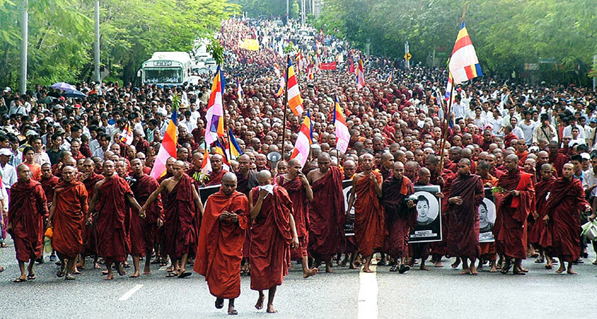Silencing the Sangha

Ashin Issariya, whose pen name is “King Zero” and who was a monk leader during the Saffron Revolution, said sinister tactics are employed to monitor the monasteries. Government-sponsored monks who are equivalent to spies have been placed in monasteries associated with pro-democracy activities and the regime has given gifts such as cars, televisions and mobile phones to senior monks in order to win their support.
“It is not the monks’ fault; they don’t have enough education and are exploited by the generals,” said Ashin Issariya.
Along with the strict election laws and regime infiltration of the monasteries, the role of monks in the 2010 election is limited by the fact that many leading monks are not available to participate. Following the Saffron Revolution, many of the monk leaders fled to Thailand, where they either remain in refugee camps or have been resettled in third countries. The Assistance Association for Political Prisoners-Burma reports that more than 250 monks continue to serve lengthy prison sentences. And in recent months, a handful of monks have been arrested for being in possession of anti-election material—which has undoubtedly had a chilling effect on the Sangha.
In addition, Ashin Issariya said that more than 18 monasteries that were linked to the Saffron Revolution have been closed in the run up to this year’s election. Monks also require permission from the junta to go abroad and their travel between cities has been restricted.
Although the 2010 election laws strictly prohibit the use of religion as a political tool, it appears that the Union Solidarity and Development Party (USDP) has been doing so with impunity. One monk based in Rangoon, who chose to speak to The Irrawaddy over the phone rather than meet, said the USDP had visited his monastery several times and pressured monks to tell people to vote for their party. “We did not want them to enter, but they did and insulted Buddhism with their behavior. We are not political puppets,” he said.
The USDP has reportedly used similar tactics in monasteries throughout Burma, but some monks have resisted the pressure to be used as the junta’s political tool. Narinjara, an exile Arakanese news agency based in Bangladesh, recently reported that monks at a monastery in Sittwe had denied access to USDP candidates wishing to hold a rally in their monastery. “The Election Commission has not allowed other political parties to use religious buildings for rallies. This is the reason the abbot opposed the USDP using his monastery for the rally,” a senior monk was quoted as saying. Monks in other regions have also stopped the USDP from entering their monasteries, sources say.
Dr. Than Nyein, a leader of the National Democratic Force (NDF), a party made up of former NLD members, said his party was being particularly careful not to use the monasteries for political purposes. However, he said, the USDP has frequently visited religious monasteries across the country. “If the USDP are traveling and they pass a monastery and go in, they can’t claim that is for personal purposes. It seems like it is for the party’s benefit. Someone should be looking at these cases,” Dr Than Nyein said.
The USDP has attempted to garner the use of other religious organizations for political gain as well. In Kachin State, the USDP reportedly has donated to churches to win the votes of members and has entered several churches without permission to hold rallies. “Although the church does not want the USDP there, we are too afraid to tell them to leave,” said a Christian clergyman who asked not to be named. “We can see that they are using our churches to persuade the people to vote for them, but the EC [Election Commission] should be stopping this, not us.”
Cheery Zahau, an ethnic Chin activist, said she had received reports of the USDP targeting Baptist churches in Chin state. “The USDP has forced respected members of church groups to run as candidates for their party, so members of their church will probably vote for them,” said Zahau. “Chin people are too honest and will just vote for the people they like.”
On the other hand, a leading member of the Chin Progressive Party said his party has avoided churches because they are concerned they would run afoul of the election laws. The USDP’s ability to use churches in their campaign is just one of many advantages it has over the small Chin parties, he said.
The USDP has also been keen to win the support of Burma’s Muslims, who make up more than 4 percent of Burma’s population. Rangoon’s mayor, Aung Thein Lin, a USDP candidate for parliament, recently promised to complete construction of a mosque in return for 2,000 USDP votes from the local community. However, the Buddhist community complained and the local authorities retracted the proposal.
« previous 1 | 2 | 3 next page »
